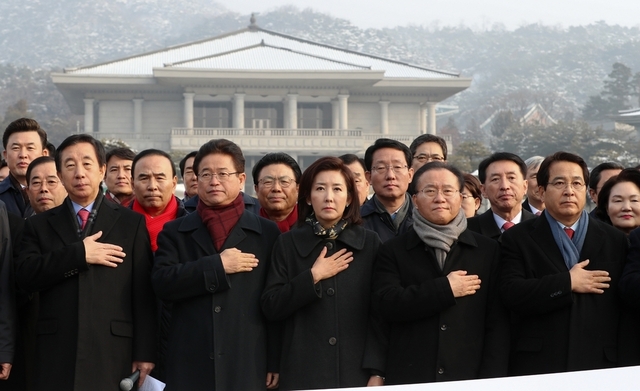Posted on : Feb.24,2018 14:32 KST
Modified on : Feb.24,2018 14:41 KST
 |
|
Members of the Liberty Free Korea party hold a press conference in front of the Blue House in Seoul on Feb. 23 to protest the acceptance of the second North Korean high-ranking delegation led by North Korean Workers’ Party Central Committee vice chairman Kim Yong-chol. (by Kim Jung-hyo, staff photographer)
|
The Liberty Korea Party (LKP) has been saying some extreme things with its harsh denunciations of North Korean Workers’ Party Central Committee vice chairman Kim Yong-chol’s attendance of the Pyeongchang Olympics closing ceremony. Kim, who is heading a visiting North Korean delegation, has been accused of being responsible for the 2010 sinking of the ROKS Cheonan. There have been ugly remarks about “killing him the second he sets foot in South Korea,” “putting him under emergency arrest as a serial killer,” and even blocking him physically.
President Moon Jae-in has been singled out for accusations of “treason,” “aiding the enemy,” and being an “accomplice to North Korea.” The opposition is within its rights to criticize the administration on matters concerning inter-Korean relations, but this sort of irresponsible behavior is a different story. How is this kind of extreme and emotionally charged rhetoric supposed to help the already perilous conditions on the Korean Peninsula?
To be sure, there are plenty of South Koreans who are displeased about Kim visiting as a “guest” at the closing ceremony. It is also true that he served as director of North Korea’s Reconnaissance General Bureau at the time of the Cheonan’s sinking. But no clear basis exists for identifying him as “responsible” for that incident. A joint civilian-government investigation team found that the Cheonan sank “as a result of a North Korean torpedo,” but said that it could not be determined which organization or individual orchestrated the attack.
On Feb. 23, the National Intelligence Service explained before the National Assembly Intelligence Committee that “we can speculate” about the responsibility, but that “it is not clear that Kim Yong-chol directed” the attack. Neither the US nor the South Korean government directly tied Kim to the Cheonan sinking when they listed him as subject to independent sanctions. Those sanctions are financial and do not entail a travel ban, which means the visit is not an issue on that basis.
The same reasoning probably explains why the Park Geun-hye administration did not turn Kim away when he was serving as North Korea’s senior representative for inter-Korean military talks in 2014. At the time, the Saenuri Party (the LKP’s previous incarnation) did not tie him to the Cheonan incident. On the contrary, its members published commentaries expressing “hope for progress in inter-Korean dialogue.”
The LKP needs to jettison its “that was fine, this is different” double standard. Its politicians claim Pyongyang’s goal is to foment conflict among South Koreans – but if that’s the case, it’s more befitting a political party to respond to matters in a more cool-headed, non-partisan way. Things like the LKP calling a halt to a National Assembly judicial reform special committee that had nothing to do with this issue leave it open to charges that it is playing into North Korea’s hands.
Kim Yong-chol is currently the top official for inter-Korean relations in North Korea. This means he is capable of engaging in practical and specific dialogue on peninsula issues and progress in inter-Korean relations. If we start taking issue with his past behavior like the LKP is asking us to do – behavior that hasn’t even been proven – this would rule out the very possibility of dialogue with North Korea. There’s no reason for us to refuse to deal face-to-face with anyone if it will help in improving inter-Korean relations and relieving tensions on the peninsula.
Please direct questions or comments to [english@hani.co.kr]









